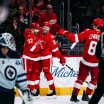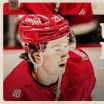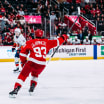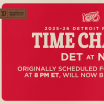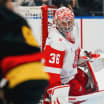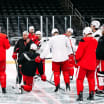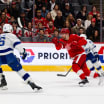DETROIT- Eric Tangradi is aware he is not a Detroit prospect.
At 29 years old, the former second-round pick (46th overall) of the Anaheim Ducks in the 2007 NHL Entry Draft, describes himself as a "journeyman" hockey player.
Mantha values Tangradi's guidance
Grand Rapids Griffins veteran offers insight to young Red Wings
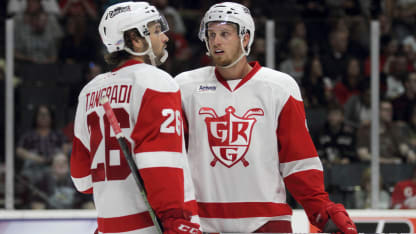
© Mark Newman/Grand Rapids Griffins
By
Arthur J. Regner @arthurjregner / DetroitRedWings.com
Signed as a free agent by the Wings in July of 2015, Tangradi has played in one game with the Red Wings, a 4-2 victory against the New York Islanders on January 25, 2016, at Barclays Center in Brooklyn.
He didn't register a point, played seven shifts and his total ice time was 6:55. Tangradi lost his only face-off and was credited with one hit.
But to gauge Tangradi's impact on the Wings, you must look beyond his on-ice performance.
Tangradi was a guest on episode 54 of The Red and White Authority podcast and discussed the ups and downs of his hockey career.
The Red and White Authority - Episode 54: Eric Tangradi
During this candid conversation, he revealed when he joined the Griffins, his approach toward younger players changed. Tangradi decided to mentor the Wings' top prospects because he had gone through the process of being a high-end talent with lofty expectations.
While he was with Pittsburgh, where he was penciled in to be a winger on Sidney's Crosby's line, Tangradi began to understand the harsh reality of the NHL.
"Unfortunately, the NHL life is totally different than juniors, totally different than the AHL," Tangradi said. "When guys leave the rink, they leave, you don't see a lot of people outside the rink.
"I didn't have that support system, I didn't have somebody I could lean (on) and it was really hard going back to the hotel room at 21 years old. At times I just turned the lights off and watched a movie because you're so upset with the way things are going."
As he became older and bounced around from organization to organization, Tangradi never forgot how he felt as a youngster playing for the Penguins' AHL team in Wilkes-Barre/Scranton.
"At 29 now and being part of this (Detroit) organization for three years, I've seen guys in this locker room, the Manthas, the Athanasious, the Bertuzzis, those are guys that I've seen at times have such high expectations and struggle here," Tangradi said. "I take pride I was the first guy to go over to them and make sure they got their confidence back that they were playing the right way.
"Hopefully, I left a lasting impression on them that helped them move on to the next level. Those are all guys I played with down here when they (the Red Wings organization) were trying to get them out of funks.
"I put them (under) my wing and gave the guidance I wish I had when I was young."
One player he bonded with was Anthony Mantha, who was experiencing growing pains as a second-year pro when Tangradi arrived in Grand Rapids.
"Any experience you can gain as a young player, you want to soak it in," Mantha said. "The couple years I was in Grand Rapids, there were a couple (mentors). There was Tangradi, there was (Nathan) Paetsch and there was (Jeff) Hoggan. My last year there was (Matthew) Ford.
"All those vets have so much experience, as soon as they could give you a couple of tips of how to react to a certain situation it always helps, or if doesn't help right away it might help you later in your career.
"It might be in four years something is going to happen and you're going to be like, 'Hey, Tangradi told me this or that.' You just kind of learn it's a process."
Mantha admits when he turned pro with the Griffins he had a "junior mentality" where he played exactly the same way he did in juniors. He had so much success in juniors (129 goals, 260 points in 189 games for the Val-d'Or Foreurs in the Quebec League) that he didn't see any need to change his game.
In juniors, Mantha could coast in some games and still get staggering results. It took him a while to realize in the AHL and NHL, it's 100 percent effort every single game or you'll be left in the dust.
"That was something I had to learn and obviously all the players I played with in Grand Rapids and the coaching staff helped me to get through those bad habits," Mantha said. "Any little details or tips they could give me really helped."
If Tangradi has delivered a constant message to Detroit's prospects, it's not to feel they have a right of entitlement. It is a common theme for many high-end prospects who tend to sulk when things are not going according to their plan.
When Tangradi was asked when it occurred to him that he needed to reassess his approach to the game and his career, he was direct while recalling two specific moments.
"Being in Wilkes-Barre and putting up numbers, not being called up and blaming it on somebody else instead of being accountable and holding myself to a higher standard," he said. "I also learned a valuable lesson in Winnipeg. For me to be an NHL'er, I needed to excel. I was told by a coach before I was put on waivers that I did everything good, but I didn't do anything great - that really stuck with me and I was put on waivers."
Tangradi is in the last year of his deal with the Wings. He will become a free agent on July 1. He would like to stay with the Wings organization, but he also wants another shot to play in the NHL.
Whether he gets another opportunity to play in Detroit or not, Tangradi's presence on the ice will be felt by the Red Wings team for many seasons to come.
Main photo by Mark Newman/Grand Rapids Griffins

